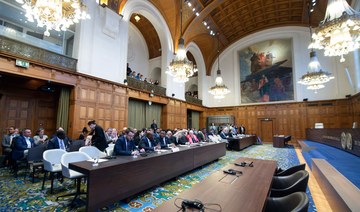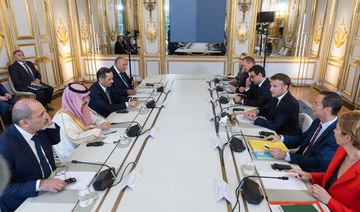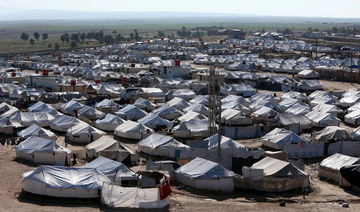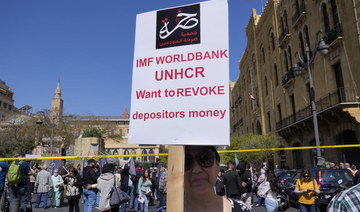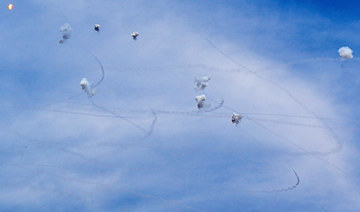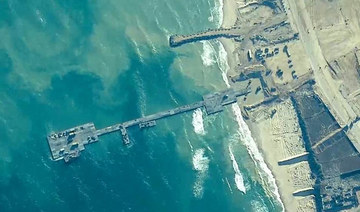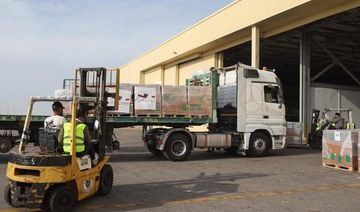BEIRUT/DAMASCUS: A car bomb killed 20 people in Damascus on Sunday and wounded dozens more, the Syrian foreign ministry said, the first such bombing in the Syrian capital since a series of jihadist suicide attacks in March.
The authorities said it was one of three car bombs that were meant to be blown up in crowded areas of the capital on Sunday, the first day back to work from the Eid Al-Fitr holiday. Security forces pursued and destroyed the other two.
Officials said the bombers had been prevented from reaching their intended targets, otherwise the casualty toll would have been higher.
There was no immediate claim of responsibility for the attack. Damascus was hit by two separate, multiple suicide bomb attacks in March, one of them claimed by Daesh and the other by the Islamist insurgent alliance Tahrir Al-Sham.
In a letter to the UN secretary general and the head of the security council, the foreign ministry said the blast that killed 20 people in the Bab Touma area near the Old City had also wounded dozens of women and children.
State media said the bomber had been spotted and pursued by the security forces and set off the bomb after he had been encircled in the area.
Damascus has enjoyed relative security in recent years even as the six-year-long civil war has raged on in nearby areas.
Footage broadcast by state TV from the blast that caused the fatalities near the Old City showed roads scattered with debris, several badly damaged cars, and another one that had been turned into a pile of twisted metal.
Footage from another of the blast sites showed what appeared to be the remains of a person and badly damaged vehicles outside a mosque in the Baytara traffic circle near the Old City.
On March 15, two suicide bomb attacks in Damascus killed several dozen people, most of them at the Palace of Justice courthouse near the Old City. Islamic State claimed responsibility for that attack.
On March 11, a double suicide attack in the capital killed scores of people, most of them Iraqi Shiite pilgrims. That attack was claimed by the Tahrir Al-Sham alliance of Islamist insurgents, which is spearheaded by a jihadist group formerly known as the Nusra Front.
Syrian government forces, which have defeated rebel fighters in several suburbs of Damascus over the last year, are currently battling insurgents in the Jobar and Ain Tarma areas on the capital’s eastern outskirts.
A rebel group accused the army of using chlorine gas in the fighting on Saturday. The army denied the claim as fabrications. (Reporting by Tom Perry in Beirut and Firas Makdesi and Kinda Makieh in Damascus)
20 killed as three car bombs rock Damascus
20 killed as three car bombs rock Damascus

Gaza zookeeper fears for his animals after fleeing Rafah
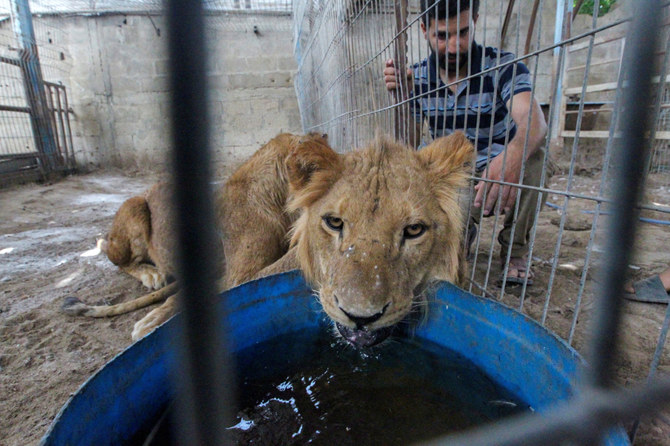
KHAN YOUNIS: In a cowshed in Gaza’s Khan Younis, zookeeper Fathi Ahmed Gomaa has created a temporary home for dozens of animals, including lions and baboons, having fled with them from Israel’s offensive in Rafah.
“We’ve moved all the animals we had, except for three big lions that remain (in Rafah),” he said.
“I ran out of time and couldn’t move them.” Ahmed abandoned his zoo in Rafah when Israel ordered the evacuation of parts of the southern Gazan city.
Before the offensive, the city on the border with Egypt had been spared a ground invasion, and more than half of the Gaza Strip’s population was sheltering there.
Now, the Israeli offensive has sent more than 800,000 people fleeing from Rafah, according to the UN, with Gomaa and his family among them.
“I am appealing to the Israeli authorities: these animals have no connection to terrorism,” Gomaa said, saying he wanted their help in coordinating with aid agencies to rescue the lions left behind in Rafah.
He fears they won’t survive long on their own.
“Of course, within a week or 10 days, if we don’t get them out, they will die because they’ll be left with no food or water.”
Gomaa said he had already lost several of his animals to the war: “Three lion cubs, five monkeys, a newborn monkey, and nine squirrels.”
And while the squawking of parrots fills the air, many of Gomaa’s other birds are no longer with him.
“I released some of the dogs, some of the hawks and eagles, some of the pigeons, and some of the ornamental birds. I released many of them because we didn’t have cages to transport them.”
In the cowshed, Gomaa is making do with what he has, using improvised fencing to raise the heights of the pens so that their new inhabitants, spotted deer, can’t leap out.
Israeli troops began their assault on Rafah on May 7, defying widespread international concern for the safety of the 1.4 million civilians sheltering in the city.
EU considers possible Rafah border mission, diplomats say
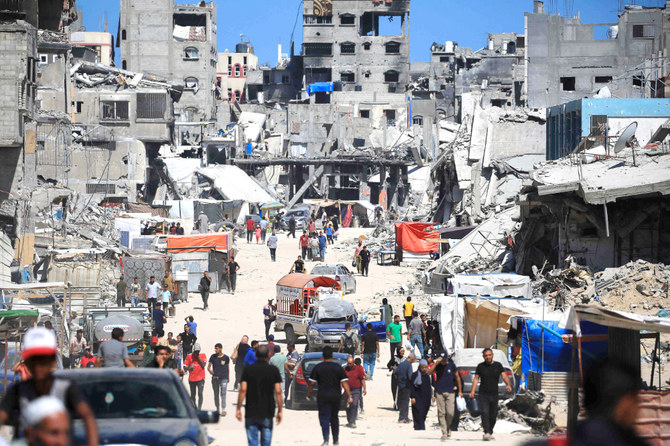
BRUSSELS: Talks on deploying a EU mission at the Rafah border crossing in Gaza are at a preliminary stage and the deployment will not happen without an end to the war between Israel and Hamas, a senior EU official said on Friday.
EU foreign ministers will hold their monthly meeting in Brussels on Monday, and discuss how to improve humanitarian aid deliveries to Gaza.
Two diplomats said the US had suggested the EU revive its EU Border Assistance Mission or EUBAM Rafah, which has not been operational since 2007, when Hamas seized full control of Gaza.
The crossing is the main entry point for aid from Egypt and has been closed since Israeli forces took control of it from the Gazan side nearly three weeks ago.
Rafah city is now fire in an Israeli military assault, which judges at the top UN court said on Friday should immediately halt.
“Even if we now have people on the ground talking to the different parties and seeing how it could be done, we are in a very preliminary part of the story,” said the senior official.
The official said EU foreign policy chief Josep Borrell could be mandated by the 27 members on Monday to come up with “some kind of operative conclusions that could allow the mission to deploy.”
He said a deployment could not happen “in the current circumstances, not in war circumstances.”
“We are talking about the future,” the official said.
Three EU diplomats said the discussion would be on the table, but there was nothing concrete to discuss. One said the proposal was a “long shot.”
The mission would need unanimous approval from EU member states. Also, EUBAM is a civilian mission, and given the potentially dangerous nature of the operation, personnel and equipment would need to be adapted.
Diplomats said that such a mission could go ahead only if Egypt and Israel were also in favor.
Two US officials said Washington was reviewing options to secure the opening of the Rafah crossing, but no definitive plans have been developed yet. Israel began its offensive in Gaza after Hamas’ deadly attack on southern Israel on Oct. 7.
Four Britons repatriated from Syria camp, Kurds say
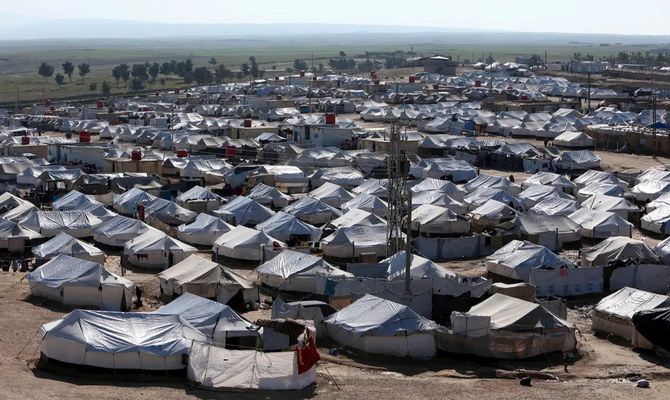
- The Kurdish administration said it had “handed over a woman and three children to the United Kingdom“
- The four had been interned in the Roj camp where militants’ relatives are held
QAMISHLI, Syria: Kurdish authorities in northeast Syria said Friday that they had handed over a woman and three children to British representatives for repatriation, with a source saying they had been held in a camp for militants’ relatives.
Five years after the Daesh group was driven out of its last bastion in Syria, tens of thousands of the militants’ family members, including from Western countries, remain in detention camps in the Kurdish-controlled northeast.
The Kurdish administration said it had “handed over a woman and three children to the United Kingdom,” following a meeting with a British delegation led its Syria envoy Ann Snow.
A source within the administration told AFP the four had been interned in the Roj camp where militants’ relatives are held.
Britain’s foreign ministry said UK officials had “facilitated the repatriation of a number of British nationals from Syria to the United Kingdom.”
“This repatriation is in line with the long-standing policy that all requests for UK consular assistance from Syria are considered on a case-by-case basis, taking into account all relevant circumstances including national security,” the spokesperson said.
On May 7, the United States announced it had brought back 11 Americans including five minors, as well as a nine-year-old non-US sibling of an American, from internment camps in northeastern Syria.
The United States in the same operation facilitated the repatriation of six Canadian citizens, four Dutch citizens and one Finnish citizen, eight of them children, Secretary of state Antony Blinken said.
And in December, the Kurdish administration handed over to Britain a woman and five children who had also been held in a camp.
Despite repeated appeals by the Kurdish authorities, a number of Western countries have refused to take back their citizens from the camps.
Among the most high profile cases is that of Shamima Begum, a former Briton stripped of her citizenship after leaving the country aged 15 to marry an Daesh group fighter.
Lebanon ‘open to any effort to curb Israeli aggression,’ says Berri
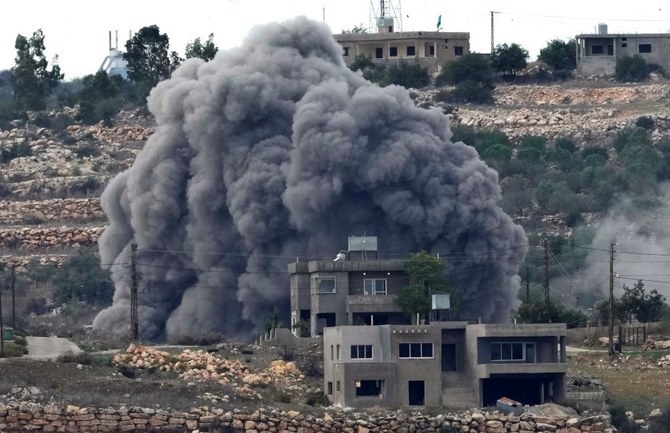
- Parliamentary speaker accuses Israel of ‘greed’ over Lebanese resources
- Berri’s statement came as hostilities between Hezbollah and the Israeli army in the southern border region entered their 230th day
BEIRUT: Lebanon is willing to cooperate with any international effort to stop Israeli aggression and bring security to the region, Parliamentary Speaker Nabih Berri said on Friday.
However, in a statement marking the 24th anniversary of Israel’s withdrawal from southern Lebanon in 2000, Berri warned that Lebanon “is not ready to waive any of its sovereign rights.”
He also accused Israel of displaying “greed toward Lebanon, its resources, its entity, and its land, sea, and air borders.”
Berri’s statement came as hostilities between Hezbollah and the Israeli army in the southern border region entered their 230th day.
The parliamentary speaker called for intensified international and regional efforts to halt Israel’s assault in the Gaza Strip, saying this was crucial to maintain security and stability in the entire region.
Hezbollah claims its actions have been in support of Gaza amid further Israeli threats to Lebanon.
Israeli Prime Minister Benjamin Netanyahu vowed on Thursday from the northern command headquarters “to carry out detailed, important and even surprising plans to return displaced settlers to the north.”
He claimed Israel had killed hundreds of Hezbollah fighters.
Benny Gantz, a minister in the Israeli war Cabinet, said: “Get ready from now on for the return of the residents of the north to their houses safely in early September by force or order.”
Berri returned from Tehran after attending the funeral of Iranian President Ebrahim Raisi, who was killed in a helicopter crash on May 19.
In his message to the Lebanese, he renewed Lebanon’s “commitment and adherence to UN Resolution 1701, and all its terms and stipulations.”
The resolution calls for an end to hostilities between Israel and Hezbollah, the withdrawal of Israeli forces from Lebanon to be replaced by Lebanese and UNIFIL forces in southern Lebanon, and the disarmament of armed groups including Hezbollah.
Berri accused Israel of ignoring the resolution “since the moment it was issued, with over 30,000 land, sea and air violations.”
Lebanon “upholds its right to defend its land with all the available means in the face of Israeli hostilities,” he said.
He called for the liberation of “the remaining occupied territory in the Kfarchouba Hills, the occupied Shebaa Farms, the northern part of the GHajjar village, and the contested border points with occupied Palestine all the way to the B1 point in Ras Al-Naqoura.”
Caretaker Minister of Defense Maurice Slim said that Lebanon preferred peace to war.
However, “defending the land was and will be the Lebanese state’s choice through the resilience of its army and people, especially the steadfast ones who are still residing in their villages and towns to repel the aggression,” he said.
Israeli warplanes on Thursday struck the town of Maroun Al-Ras in the Bint Jbeil district.
Sirens sounded in Israeli settlements opposite the border with Lebanon amid fears of possible drone attacks.
The Israeli newspaper Yedioth Ahronoth reported on Friday that Hezbollah’s drones caused significant damage in the northern towns and resulted in several fatalities.
Another newspaper, Israel Hayom, said that Hezbollah’s drones are “one of the biggest threats facing Israel in the northern arena.”
The newspaper said that Hezbollah leader Mohammed Hassan Fares, who was killed by an Israeli drone strike last week in Qana, was a scientist who specialized in robotics and machine learning.
2,000 aid trucks stuck at Rafah border: Norwegian Refugee Council
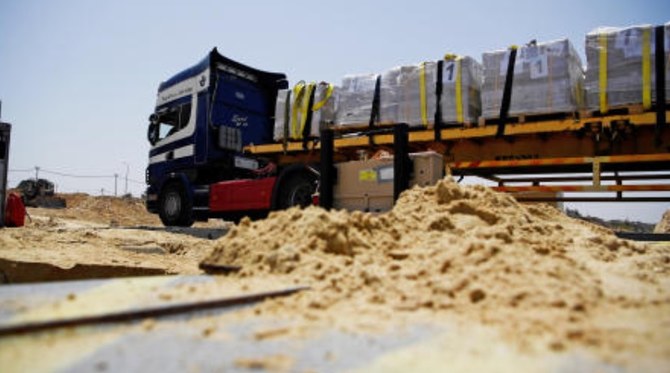
- Palestinians ‘actively deprived’ of essential items as Israel steps up operations in city
- Some in Gaza have been displaced as many as 9 times since October
LONDON: The Norwegian Refugee Council has warned that 2,000 aid trucks are stuck in Egypt at the Rafah border crossing, with Palestinians in Gaza being “actively deprived” of essential goods.
Rafah is the last remaining area of Gaza yet to come under full assault by Israeli forces, with fears now mounting of an imminent operation to take the southern city.
The NRC’s head of operations in Gaza, Suze van Meegen, told the BBC: “The city of Rafah is now comprised of three entirely different worlds: the east is an archetypal war zone, the middle is a ghost town, and the west is a congested mass of people living in deplorable conditions.”
She said medical supplies, tents, water tanks and food are being held up at the border, and in some cases Palestinians in Gaza have been displaced as many as nine times since Israel launched its military operation last October.
“People have no choice but to put their faith in so-called ‘humanitarian safe zones’ designated by the forces that have killed their family members and destroyed their homes,” she added.
Israeli journalist Amos Harel told the BBC that he believes Israel is moving ahead with plans to occupy Rafah with tacit US support.
“It’s quite clear that the Americans are no longer trying to prevent Israel from occupying Rafah. So the Israelis may proceed carefully and not too quickly. But it’s less of a question of whether the Israelis are going to occupy Rafah. It’s quite clear that they are,” he said.
It comes despite earlier warnings by US President Joe Biden against Israel attacking “population centers,” and with the International Court of Justice set to rule on the legality of the Israeli campaign in Gaza after a case was submitted by South Africa in December accusing Israel of genocide.


